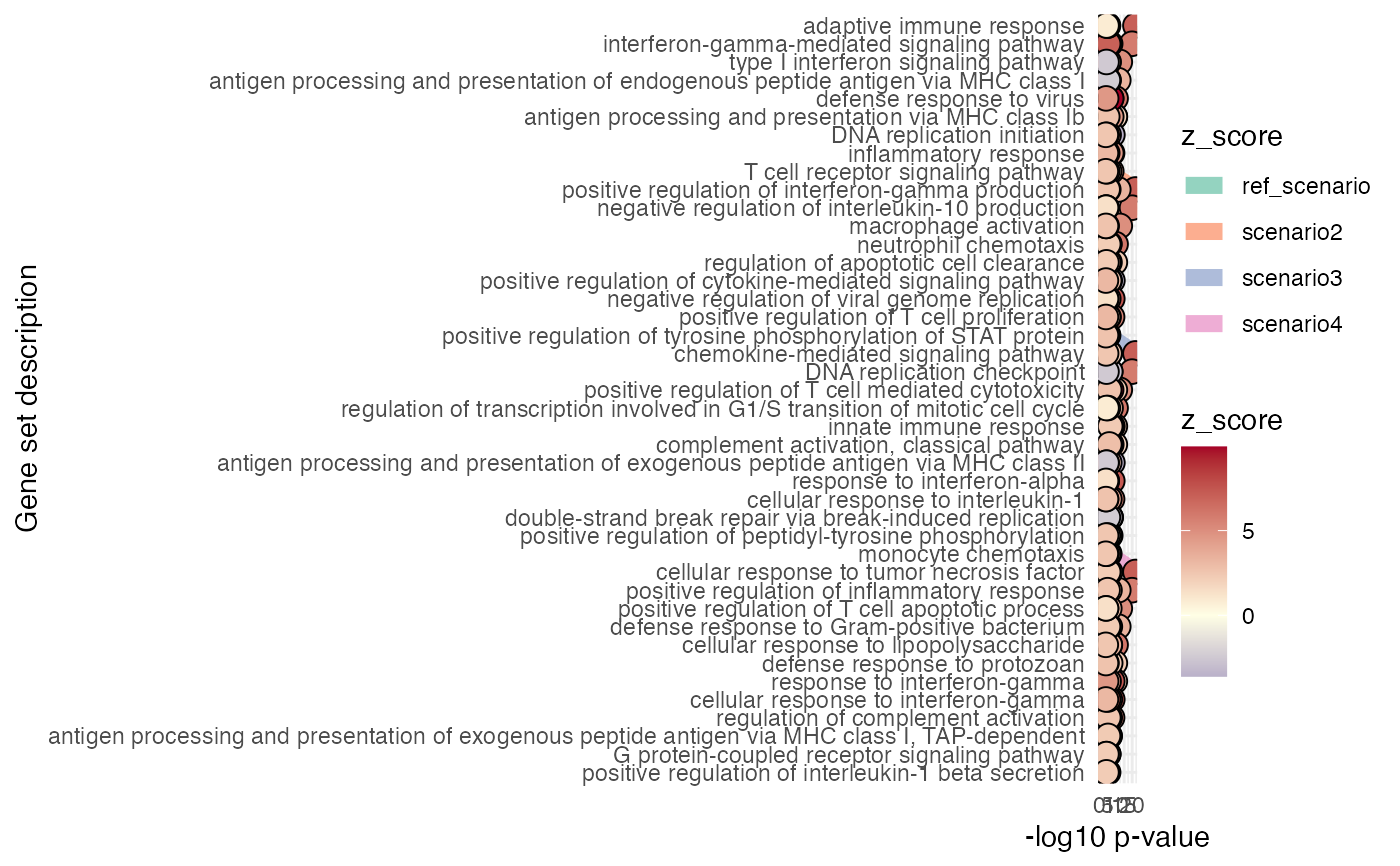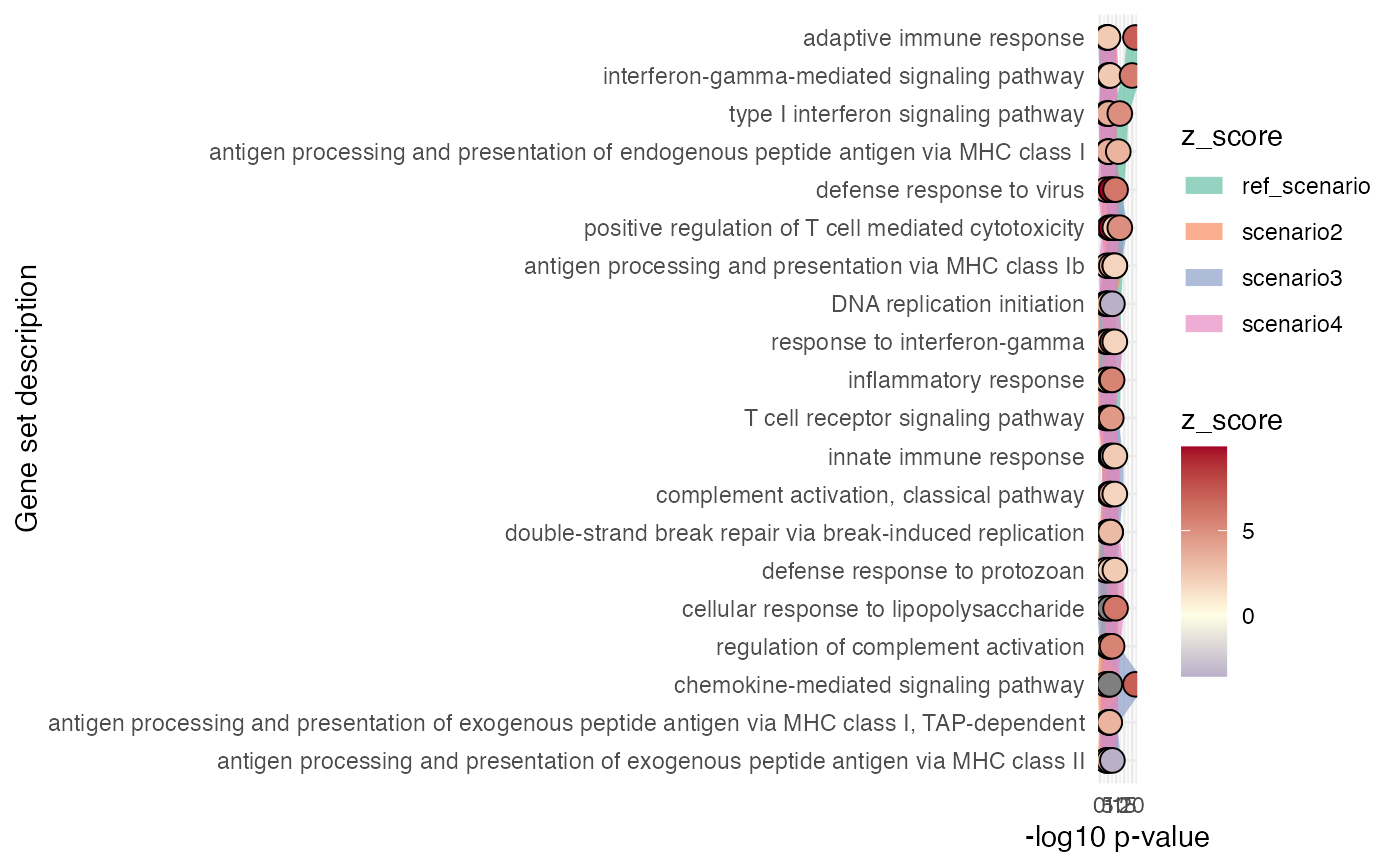Plots a summary of enrichment results - horizon plot to compare one or more sets of results
gs_horizon(
res_enrich,
compared_res_enrich_list,
n_gs = 20,
p_value_column = "gs_pvalue",
color_by = "z_score",
ref_name = "ref_scenario",
sort_by = c("clustered", "first_set")
)Arguments
- res_enrich
A
data.frameobject, storing the result of the functional enrichment analysis. See more in the main function,GeneTonic(), to check the formatting requirements (a minimal set of columns should be present).- compared_res_enrich_list
A named list, where each element is a
data.frameformatted like the standardres_enrichobjects used byGeneTonic. The names of the list are the names of the scenarios.- n_gs
Integer value, corresponding to the maximal number of gene sets to be displayed
- p_value_column
Character string, specifying the column of
res_enrichwhere the p-value to be represented is specified. Defaults togs_pvalue(it could have other values, in case more than one p-value - or an adjusted p-value - have been specified).- color_by
Character, specifying the column of
res_enrichto be used for coloring the plotted gene sets. Defaults sensibly toz_score.- ref_name
Character, defining the name of the scenario to compare against (the one in
res_enrich) - defaults to "ref_scenario".- sort_by
Character string, either "clustered", or "first_set". This controls the sorting order of the included terms in the final plot. "clustered" presents the terms grouped by the scenario where they assume the highest values. "first_set" sorts the terms by the significance value in the reference scenario.
Value
A ggplot object
Details
It makes sense to have the results in res_enrich sorted by
increasing gs_pvalue, to make sure the top results are first sorted by the
significance (when selecting the common gene sets across the res_enrich
elements provided in compared_res_enrich_list)
The gene sets included are a subset of the ones in common to all different
scenarios included in res_enrich and the elements of compared_res_enrich_list.
Examples
library("macrophage")
library("DESeq2")
library("org.Hs.eg.db")
library("AnnotationDbi")
# dds object
data("gse", package = "macrophage")
dds_macrophage <- DESeqDataSet(gse, design = ~ line + condition)
#> using counts and average transcript lengths from tximeta
rownames(dds_macrophage) <- substr(rownames(dds_macrophage), 1, 15)
dds_macrophage <- estimateSizeFactors(dds_macrophage)
#> using 'avgTxLength' from assays(dds), correcting for library size
# annotation object
anno_df <- data.frame(
gene_id = rownames(dds_macrophage),
gene_name = mapIds(org.Hs.eg.db,
keys = rownames(dds_macrophage),
column = "SYMBOL",
keytype = "ENSEMBL"
),
stringsAsFactors = FALSE,
row.names = rownames(dds_macrophage)
)
#> 'select()' returned 1:many mapping between keys and columns
# res object
data(res_de_macrophage, package = "GeneTonic")
res_de <- res_macrophage_IFNg_vs_naive
# res_enrich object
data(res_enrich_macrophage, package = "GeneTonic")
res_enrich <- shake_topGOtableResult(topgoDE_macrophage_IFNg_vs_naive)
#> Found 500 gene sets in `topGOtableResult` object.
#> Converting for usage in GeneTonic...
res_enrich <- get_aggrscores(res_enrich, res_de, anno_df)
res_enrich2 <- res_enrich[1:42, ]
res_enrich3 <- res_enrich[1:42, ]
res_enrich4 <- res_enrich[1:42, ]
set.seed(2 * 42)
shuffled_ones_2 <- sample(seq_len(42)) # to generate permuted p-values
res_enrich2$gs_pvalue <- res_enrich2$gs_pvalue[shuffled_ones_2]
res_enrich2$z_score <- res_enrich2$z_score[shuffled_ones_2]
res_enrich2$aggr_score <- res_enrich2$aggr_score[shuffled_ones_2]
set.seed(3 * 42)
shuffled_ones_3 <- sample(seq_len(42)) # to generate permuted p-values
res_enrich3$gs_pvalue <- res_enrich3$gs_pvalue[shuffled_ones_3]
res_enrich3$z_score <- res_enrich3$z_score[shuffled_ones_3]
res_enrich3$aggr_score <- res_enrich3$aggr_score[shuffled_ones_3]
set.seed(4 * 42)
shuffled_ones_4 <- sample(seq_len(42)) # to generate permuted p-values
res_enrich4$gs_pvalue <- res_enrich4$gs_pvalue[shuffled_ones_4]
res_enrich4$z_score <- res_enrich4$z_score[shuffled_ones_4]
res_enrich4$aggr_score <- res_enrich4$aggr_score[shuffled_ones_4]
compa_list <- list(
scenario2 = res_enrich2,
scenario3 = res_enrich3,
scenario4 = res_enrich4
)
gs_horizon(res_enrich,
compared_res_enrich_list = compa_list,
n_gs = 50,
sort_by = "clustered"
)
 gs_horizon(res_enrich,
compared_res_enrich_list = compa_list,
n_gs = 20,
sort_by = "first_set"
)
gs_horizon(res_enrich,
compared_res_enrich_list = compa_list,
n_gs = 20,
sort_by = "first_set"
)
